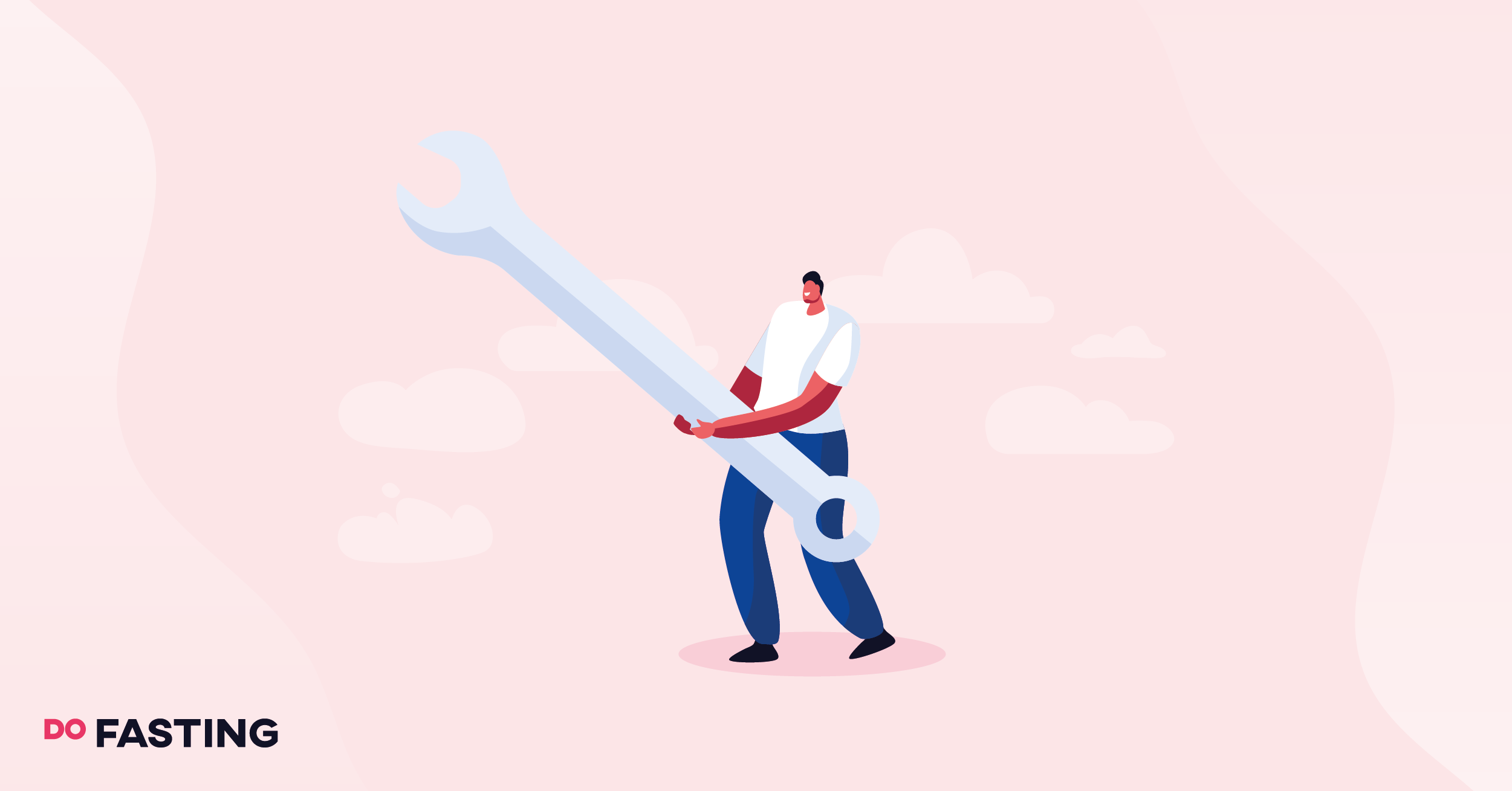Contents
What is a circadian rhythm?
So – what is circadian rhythm? Put simply, circadian rhythm’s definition is a (roughly) 24-hour genetically programmed biological clock that operates internally, in the background of your brain.
It cycles between sleepiness and alertness at regular intervals and is also commonly known as your sleeping or waking cycle. And you’ll find that these internally generated daily rhythms do not only govern us, humans.
Almost all life on earth employs an internal biological timer, and this enables us to effectively ‘know’ the time of the day, even when completely removed from time cues, such as when we’re deep underground, or experiencing an Arctic winter.
Take a
1-minute quiz
and discover how much weight you can lose with DoFasting!

When timing goes wrong: circadian rhythm disorder
Until the 19th century, society was still primarily based on agriculture; most people spent their time outdoors and lived their lives according to the natural day and night cycle. But in today’s increasingly 24/7, artificially-lit modern world, many of us choose or are forced by economics, to work against our circadian rhythms.
And this is a problem because our gradual detachment from the solar cycle has led to an increase in ‘circadian rhythm sleep disorders’ – conditions in which affected individuals experience misaligned actual sleep times. The number of search results that pop up from ‘how to fix circadian rhythm’ is a testament to the sheer number of people who are affected by circadian rhythms thrown out of whack.
Sufferers typically complain of insomnia at times where they wish to sleep and excessive sleepiness when they actually need to stay alert. Here’s a short guide on 5 of the more common circadian rhythm disorders:
Delayed Sleep Phase Disorder (DSPD)
Do you fancy yourself a night owl? Well, not to scare you, but you might actually be displaying signs of DSPD. This disorder is a sleep pattern that’s commonly found in some adolescents and young adults; it’s characterized by a 3-hour delay or more in sleep onset and offset.
Individuals diagnosed with DSPD typically put off sleeping until 2 AM or later – they are often most alert, productive, and creative late at night. While going to bed late at night is not an issue for those allowed to sleep in late the next day, those who need to get up earlier for work or school obligations may suffer impaired performance in the afore-mentioned fields.
Advanced Sleep Phase Disorder (ASPD)
ASPD and DSPD can be considered pathological extremes of morning or evening preferences, respectively. Individuals diagnosed with ASPD typically go to bed and rise about three or more hours earlier than the societal norm, and is usually observed in the elderly.
These ‘morning larks’ retreat to bed around 6PM-9PM in the evening and wake up anywhere between 2AM-5AM. Obviously, 6 PM is a time where the majority of us would still be at work; I trust that you can see how that would cause issues.
Jet Lag
Jet lag, also known as time zone change syndrome, occurs when you travel rapidly across time zones. And you’ll find that the more time zones you cross in a short period, the more severe your symptoms – headaches, insomnia, and irritability – are likely to be.
It is generally more challenging to adapt to new time zones involved in eastward travel in comparison to the westward trip; this is because you’ll find that it’s easier to delay sleep, rather than advance rest.
Shift Work Disorder
While the misalignments in the circadian rhythm as a result of jet lag are transient, the same cannot be said for shift working. Shift workers who work throughout the night attempt to sleep during the day, but sleep is usually shorter and of more inferior quality than when sleep occurs at night.
In effect, shift workers work when they are sleepy and sleep when they are, unfortunately, not. Worryingly, research has shown that long term circadian rhythm disruption associated with shift work increases the risk of cancer and cardiovascular disease.
Narcolepsy
Narcolepsy is a chronic sleep disorder characterized by excessive sleepiness and uncontrollable episodes of falling asleep in the daytime, despite having had adequate sleep.
The disorder usually begins between the ages of 15 and 25, but it can become apparent at any age.
How to reset the circadian rhythm
You might have gone days, weeks, or even years without a consistent sleep schedule. While you may not be feeling the adverse effects of it now, you may find that your health will suffer down the road.
And besides, who likes finding falling asleep, and staying awake at appropriate times challenging? Now: it’s worth noting that person-to-person, variations exist in our alignment to the 24-hour circadian rhythm.
Or in other words, your internal clock might not be identical to your parents’ – your body operates based on its own unique rhythm. So, how to find your circadian rhythm? Well, you’d first need to reset your internal circadian rhythm and sleep schedule. Here’s how:
Practice intermittent fasting
Time-restricted eating can help put you back in sync with your circadian rhythm. In a study performed on animals, Harvard researchers found that circadian rhythms changed to match food availability.
As a result, they suggest that fasting for about 16 hours could help reset humans’ sleep clocks – this is also commonly known as ‘circadian rhythm fasting.’ Once your schedule is back on track, stick to regular breakfast and dinner times to support consistent circadian rhythms.
The reasoning behind this is simple: just like how the first sighting of morning light resets the brain clock and tells it that it’s morning already, the first bite of pancakes or sip of coffee for the day can signal to the clock in our gut to begin the day.
If we change our routine from day to day, just imagine how confused our internal clocks would get!
Take a
1-minute quiz
and discover how much weight you can lose with DoFasting!

Avoid bright and blue lights
If you’ve been paying attention, you’d know by now that light helps regulate our biological clock. Exposure to blue light – produced by the Sun, screens of TV sets, computers, and smartphones – disrupts the production of melatonin, a hormone that regulates the sleep-wake cycle.
When you head to bed, it’s crucial to reduce exposure to bright and blue lights; keep your bedroom as dark as possible. All that frantic, late-night tapping on Instagram posts is only making it harder for you to fall asleep.
If you have a boss who’s crazy about midnight emails, consider installing apps that reduce the amount of blue light emitted from your devices. This way, you can at least make sure that you’ll feel well-rested when you show up to work the next day.
Stay away from caffeine
If you’re a working adult, I’m sure you can appreciate caffeine for what it is: an absolute life-saver in the mornings. As a central nervous stimulant and the world’s most widely consumed psychoactive drug, caffeine’s most noticeable effect is alertness.
You might want caffeine’s effect in the morning when you’re struggling to keep your eyes open during that dreadful 8 AM meeting, but you certainly don’t want to drink it within 6 hours of bedtime! While you might be able to fall asleep even with significant amounts of caffeine surging through your veins, you really shouldn’t.
Caffeine can cause your sleep to be more shallow and of lower quality. So – if you want to get more in tune with your circadian rhythm, caffeine should definitely be avoided within 6 hours before bedtime.
Go to bed at the same time, every night
Research shows that an inconstant sleeping schedule throws the circadian rhythm into disarray, and impairs the quality of sleep. In line with this, it, therefore, makes sense to go to sleep at approximately the same time every night.
The regular schedule can help improve sleep quality and reduce sleep latency – the amount of time needed to fall asleep.
You can incorporate a soothing bedtime routine into your life to further prime your body for sleep. Many people find reading to be a suitable bedtime activity. Just, you know, stay away from thriller genres.
Take a
1-minute quiz
and discover how much weight you can lose with DoFasting!

Bottom Line
Getting a good night’s sleep doesn’t need to be a challenge, as long as you work with your body’s internal biological clock – the circadian rhythm. You are now empowered with the knowledge you need to fight back against lethargy and get the rest you require.
All you need to do is follow simple tips like practicing time-restricted eating and avoiding bright lights and caffeine before bedtime.
Having trouble sleeping and worried you might have a sleeping disorder? You might be out of sync with your circadian rhythm – here’s how you can fix your internal biological clock.
See how DoFasting will improve your life
Find out what works for you with this 60-sec quiz approved by our experts and get your personal revolutionary fasting assistant.
Start the Quiz
This is an evidence-based article that includes scientific citations. DoFasting’s professional writers and editors prepared the content, which a team of medical experts verified to be accurate.















